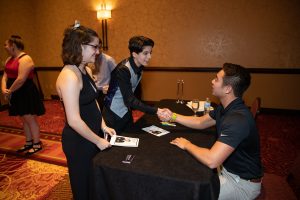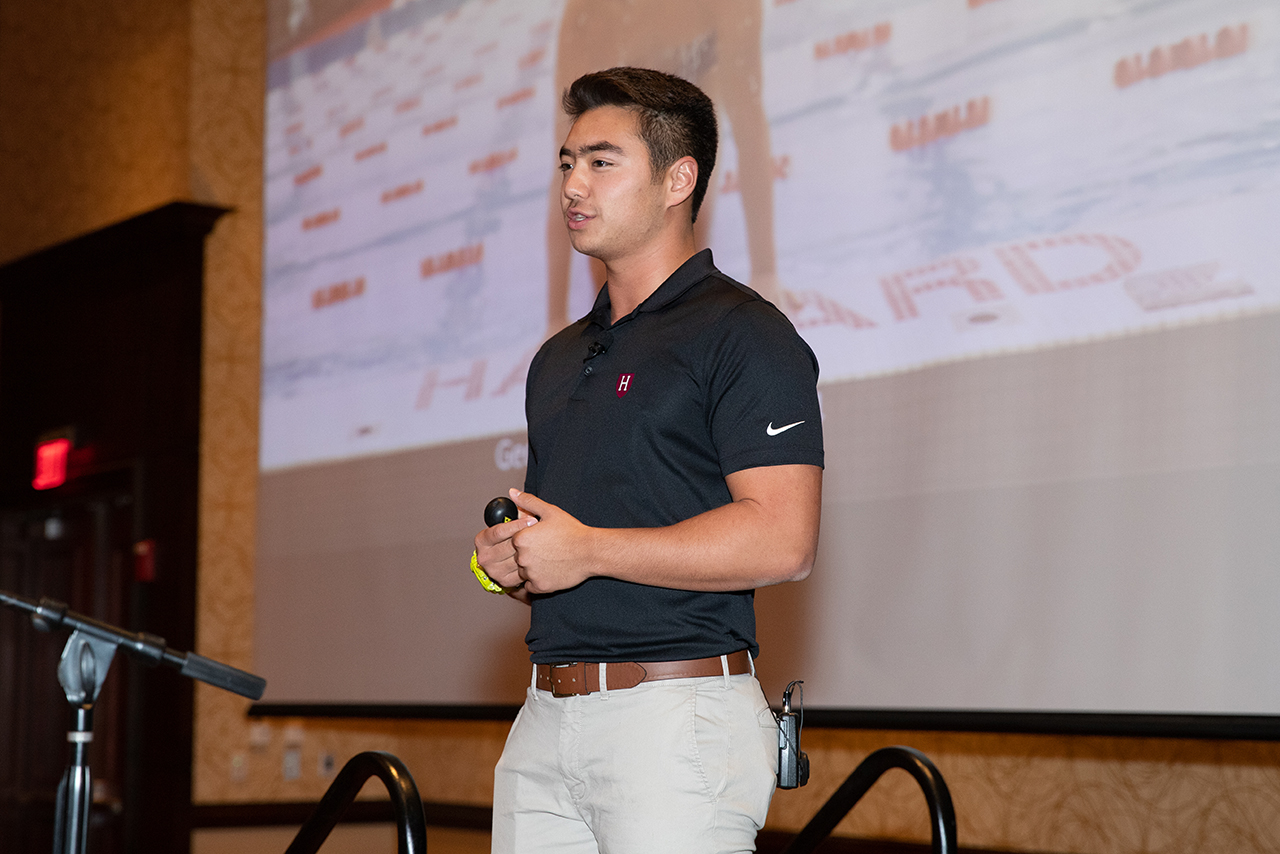Before his first collegiate swimming meet, Schuyler Bailar was understandably nervous. He stood nearly naked except for his tiny speedo. Scars on his chest provided evidence of where his breasts had been removed. Then the announcer introduced him: Harvard freshman from Washington, D.C., Schuyler Bailar (pronounced “Skyler Bayler”).
It was an important personal and historic moment for Bailar. It was his first meet swimming as a male, and it was the first time a publicly documented NCAA Division I transgender man competed as a man in any sport.
“I felt like I had a lot to prove. And I was very nervous that I couldn’t prove it,” Bailar said. “And the whole team was up there. They were cheering for me.”
The cheers continued even though he finished in last place. “They knew exactly how much that moment meant to me, what that time meant to me, what that barrier meant to me. And I always say that I think that was more glory than I’ve ever felt before.
“And that’s really why I share my story with you all today. … You can be exactly who you are. … Your identity doesn’t have to rob you from doing the things that you love.”
“I don’t think that there is any better proof that transgender athletes can truly be included on a Division I men’s program than that. They weren’t cheering for the trans athlete, they were cheering for me.”—Schuyler Bailar
Bailar spoke Friday evening, September 20, before about 300 attendees at Illinois State University Housing Services’ LGBTQA Cultural Dinner. The event was held in the Marriott Hotel and Conference Center in Uptown Normal and was co-sponsored by Event Management, Dining, and Hospitality; the Association of Residence Halls; Tri-Towers Area Government; and the Tri-Towers Diversity Coalition.
During his hourlong appearance, Bailar told his life story, how he went from being a star female swimmer to the first openly transgender NCAA Division I swimmer. He also spoke about the nuances of gender and biological diversity in humans.
“I existed between the two leading genders. That made me feel constantly like I didn’t belong.”
As a child, Bailar dressed like a boy and cut his hair short. In middle school, girls bullied him and threw him out of female bathrooms because they thought he was a boy.
“I never was girl enough to really be a girl or considered a girl by the other girls. And I was never boy enough to be a real boy, because all the boys knew that I was supposed to be this girl,” Bailar said.
He emerged as a star swimmer in high school, eventually being recruited by Harvard’s women’s team. He grew out his hair and began to dress more like how a girl was expected to dress. He also came out as gay because he thought that was what was different about him.
“I was also miserable. I had no idea how to deal with that. I was so sad, or so lost. I felt so disconnected,” Bailar said.
The year before he was supposed to enroll at Harvard University and begin competing on the women’s swim team, he experienced severe psychological issues. He took a year off to seek treatment for eating disorders at a center in Florida. It was there he realized that he was transgender, or someone who doesn’t identify with the gender they were assigned at birth.
“I was terrified. I thought I would lose swimming. I would lose Harvard,” Bailar said.

Schulyer Bailar spoke with and signed autographs for attendees following his speech at the LGBTQA Cultural Dinner.
Instead, both the men’s and women’s swim coaches at Harvard supported him, letting him choose with which team he would compete. Bailar began the masculinization process and started shopping in the men’s section, cutting his hair, and using the he/him/his pronouns.
After a lot of back and forth, he eventually decided to swim with the men’s team. His future teammates just wanted guarantees that he would swim fast and study hard. “If they had just been (jerks), I could have just dumped that option,” Bailar said.
It was not a simple choice. He was giving up the chance to be a star female athlete, to simply be another member of the men’s team. He was also attempting to do something no one had done.
“I was terrified,” Bailar said.
Bailar graduated from Harvard last spring. His last race in February was a special one. When he was on the blocks, his teammates chanted his name.
“I don’t think that there is any better proof that transgender athletes can truly be included on a Division I men’s program than that. They weren’t cheering for the trans athlete, they were cheering for me,” Bailar said. “And they knew exactly how much that meant to me to finish my swim career in that moment, and how much I struggled over those four years and beyond to be there and to finish my swimming career. And they were there with me. And it brings me to tears to even think about it.”
Bailar had some advice for those who want to be allies of transgender individuals. “A lot of people get stuck on understanding. You don’t have to get everything. You just have to love your kid through it, love your friend through it.”
Then he told the story of how his traditional Korean American grandparents, who are also conservative Catholics, embraced him after he came out to them as transgender.
Donald Reed, associate director of University Housing, said stories like that and speakers like Bailar are what the Cultural Dinners are all about. The events celebrate the campus’ diversity, highlight underrepresented groups, and help educate the public. “It was like an academic class that you want to sit through,” Reed said, laughing.
The Latino Cultural Dinner featuring award-winning journalist Soledad O’Brien will be held at 5 p.m. Monday, November 4, in the Brown Ballroom of the Bone Student Center.

